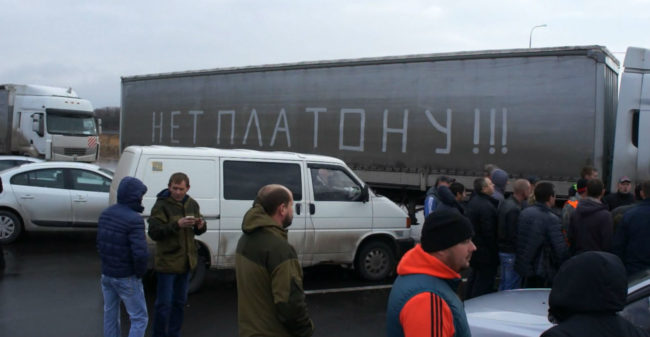

 Lorry drivers gathered in the Daghestani village of Manas are continuing to protest against the Platon road tax. The protests in Daghestan, which are part of a wider nationwide movement, are now entering their 25th day, and show few signs of ending.
Lorry drivers gathered in the Daghestani village of Manas are continuing to protest against the Platon road tax. The protests in Daghestan, which are part of a wider nationwide movement, are now entering their 25th day, and show few signs of ending.
On 18 April, Maksim Shevchenko, a member of the Presidential Council for the Development of Civil Society and Human Rights, came to meet the protesters in Manas, 30 km south of Makhachkala. About 1,000 lorry drivers joined the meeting.
‘Shevchenko met with us, listened to us. Then we went to Makhachkala and continued to discuss our problems in his office. Now, we need to draw up an approximate cost plan: how much we spend on taxes, on fuel, on fines, on car repairs, how many cargo we carry each year. Today or tomorrow we must give this information to him, so that he can show it to the Federation Council’, Umar Garisov, one of the protesters, told OC Media.
According to Garisov, there are now about 1,000 vehicles parked in protest in four car parks in Manas, despite some protesters having already left.
‘Some people have loans, someone else has a father in hospital, some just can’t take the emotions, and they leave. But we stay here. We are still many’, Garisov said.
Prime Minister Dmitry Medvedev claimed during a meeting with the State Duma on 19 April that the number of protesters against the Platon tax was only 450, out of a total of 800,000 lorry drivers registered in the system in Russia.
‘These are people who don’t want to do business legally’, Medvedev said.
The protesting lorry drivers were quick to react to the prime minister’s statement. The head of the Russian Association of Carriers, Andrey Bazhutin, countered Medvedev’s estimates. According to Bazhutin, ‘40% of 1.5 million drivers’ are involved in the nationwide strike, which is also supported by many drivers of smaller vehicles. The lorry drivers invited the prime minister to personally visit the parking lots where the strikes are taking place.
[See also our infographic with a timeline of lorry drivers’ protest in Daghestan]






